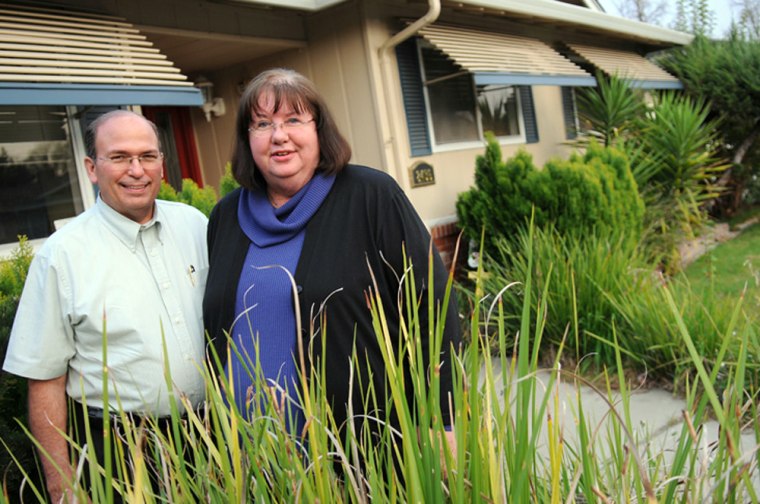Daniel Arevalo would love to sell his home in southern California, so he could move closer to his three young children. They live 45 minutes to the north, with his ex-wife.
But Arevalo can’t sell his house. The real estate market in Menifee, about 65 miles north of San Diego, is in the tank. Home values “are dropping like a rock,” said Arevalo. And even if he could sell the home that he bought five years ago for about $250,000, Arevalo doubts he would get the $175,000 needed to pay off his mortgage.
“I’m stuck,” he said.
It’s a scenario that’s playing out across the United States — people who’d like to move, but can’t. And it’s a sea change for this country.
Americans typically have been willing to pack their bags and move. But the weak economy and a limp housing market have meant that many more people in this ordinarily footloose nation are staying put, unable to sell their homes, find a job, or just too uncertain about what the future may hold.
It’s a situation that could pose added problems for the already wobbly U.S. economy, according to experts. And it’s a trend that reverses a decades-old pattern.
“This is very unusual and historic,” said William Frey, a demographer at the Brookings Institution in Washington.
Frey noted the overall rate of migration in the United States has plummeted to its lowest level since soon after the end of World War II, when the government first began to keep records on U.S. mobility. “It’s almost half of what it was during the heyday of migration.”
That period occurred in the 1950s and 1960s, when roughly 20 percent of the nation’s population picked up and moved each year. By contrast, the percentage of people changing residences fell to 11.9 percent in 2008 from 13.2 percent in 2007, according to the U.S. Census Bureau.
Experts said the drop in migration in recent years, before the current recession, reflects various factors. More people began owning their homes during those years, instead of renting. And homeowners tend to move around less. Also, young adults and early retirees tend to migrate more. However, baby boomers have yet to begin retiring in large numbers and the median age of the population is now pushing 40. So there have been fewer young adults and early retirees pulling up stakes and moving, versus past years.
The absolute number of people moving also has tumbled to historic lows, despite a rise in the nation’s population. The number of people who changed homes fell to 35.2 million from March 2007 to March 2008, down from 38.7 million the prior year. The 2008 total was the lowest since 1962, when the nation had 120 million fewer people.
Experts said this historic slowdown in migration can hurt the economy because job seekers have less ability or willingness to move to a spot or region where jobs may be more plentiful.
“Migration is one of the ways in which the market system works,“ said Richard Cebula, professor of economics at Armstrong Atlantic State University in Savannah, Ga.
“The labor markets are sluggish. They’re not adjusting efficiently,” he added, noting the situation “exacerbates a recession.”
It's even playing into the growth of cities, with many of the nation's largest metropolitan areas growing at a faster pace than the rest of the U.S., according to recent census data.
Several factors are at work behind the migration slowdown, according to experts:
- Many homeowners can't afford to sell their homes because property values have tumbled, causing millions to owe more on their homes than they’re worth. “It seems like only the really motivated sellers are coming out,” said Lydia Lin, owner of One Realty in Denver.
- Other people can’t get financing to buy a new home and so are stuck in their current residence.
- Still others can't move to take new jobs until they sell their homes, or they’re staying put because the economic outlook and the job outlook are so uncertain.
- And, finally, some people have deferred their retirement and decided against moving to a new home in a retirement spot such as Florida. That’s because they watched their retirement savings plunge with the collapse in the stock market last fall and early 2009.
Michael Hicks, director of Ball State University's Center for Business and Economic Research, said in past recessions certain parts of the country held up better than other regions. Job seekers had more incentive and a greater ability to move.
Not this time. “The recession is happening simultaneously over a very broad area,” said Hicks. “So it blunts migration.”
"In many cases, one spouse moves to another state to work while the other stays home in their main residence in an attempt to sell it,” said Hicks.
David Barnes was in such a situation.
He and his wife Linda put their Stockton, Calif., home on the market in August 2006, priced at $419,000. David moved south, to Fontana, Calif., for a job transfer with the computer printer company he works for, while Linda stayed in Stockton to sell the home. The couple wanted to move south to be closer to their children and grandchildren.
However, their five-bedroom, two-and-a-half-bathroom home house languished on the market for more than a year. A couple of offers came in. One was considered insultingly low at the time. The other appeared to contain an illegal kickback to the buyer.
The Barneses decided to take the house off the market and hope to sell it once the economy and the housing market improve.
Barnes ultimately asked his company to transfer him back to Stockton, and lucky for him there was a job there for him. But he's disappointed he and his wife aren't in Fontana, where he had hoped to retire and be closer to family.
“We’d like to watch our grandchildren grow up,” said Barnes.
